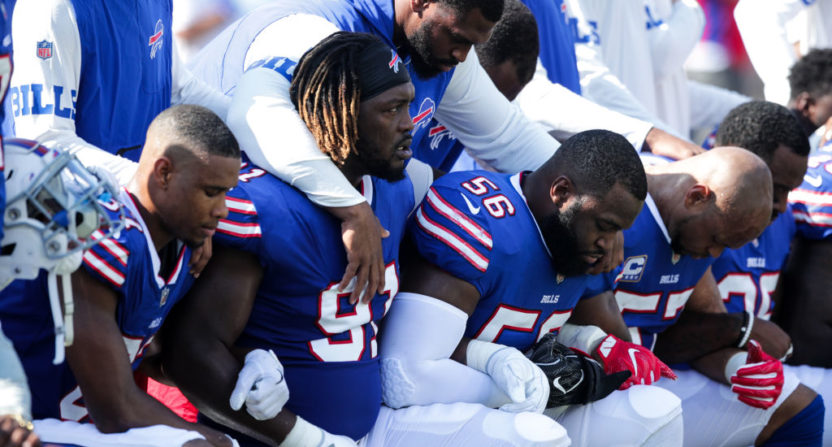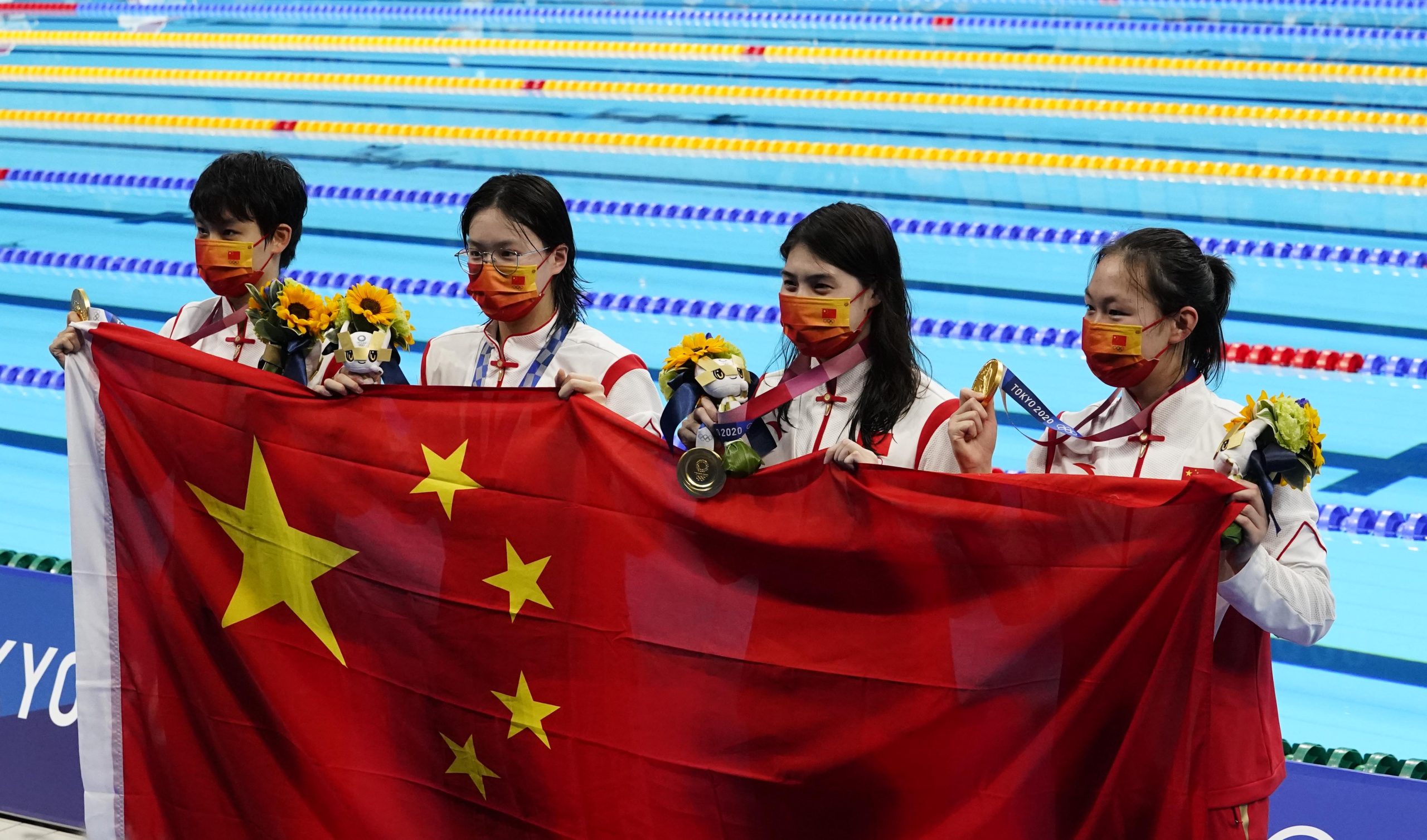We’ve seen NFL, MLB, and NBA players protest during the national anthem before their games, but not many NCAA athletes or NHL players. After the Pittsburgh Penguins announced they would be going to the White House over the weekend, let’s focus on NCAA athletes. Will they be the next group of athletes to kneel?
Let’s get this off the table first: some NCAA athletes have protested during the national anthem over the past year. Just over a year ago, members of the women’s volleyball team at the West Virginia University Institute of Technology knelt during the national anthem before a match.
With absolutely no disrespect to those brave women, their move wasn’t as strong as a similar one that could happen with football players at Alabama or basketball players at Duke. No members of the Crimson Tide football team or Blue Devils basketball program have taken similar steps to the women in West Virginia, but what’s to say that won’t happen sooner rather than later?
Football players on a Power Five team have protested for their rights in the past and won. At the University of Missouri, players threatened a strike over their president and at the University of Minnesota, players said they would boycott a bowl game over sexual assault allegations.
While these were notable and grabbed headlines, they still aren’t the same as the league wide protests that took place across the NFL this past weekend and NBA last season.
However, the protests could find their way into college football sooner or later, according to former Alabama coach Bill Curry, who said the following to USA Today back in August.
“As soon as Kaepernick did what he did, I could see that was the beginning of something and guys were going to join him,” Curry, the former President of the NFL Players Association during the 1974 strike, said. “The protest thing in the NFL is only going to grow, and the college guys, they’re figuring it out and they’ll start saying, ‘This isn’t right, this isn’t the American way,’ so I think they’ll follow along and there will be more and more organization.”
Whether college players are able to do this or not is a bigger question, as ridiculous as it sounds. Unlike NFL players, NCAA athletes aren’t paid under contracts, but in a way, they are still employees of their schools. The other issue is in college football, a lot of teams are in their respective locker rooms during the national anthem, preventing them from openly protesting the anthem.
If colleges change that practice, or if players speak up and say they want to be out there for the anthem, that could open the door to them protesting the anthem publicly before their games.
College athletes would receive a lot of criticism from some fans for protesting, and some schools’ fanbases would deliver far more scorn than others, but college athletes already get seemingly harassed by their “fans” more than they should.
In short, college athletes have learned how to deal with criticism from fans who think college athletes “owe” them something. As a result, this opens the door to them protesting something they believe in because it’s just another thing that would anger their “fans: for seemingly no reason.
Granted, there is another obstacle in the way of college athletes protesting the national anthem: the location of their schools.
Plain and simple, a quarterback at Stanford or Cal would probably endure a lot less criticism for protesting the anthem from fans than a QB at, for example, Texas or Auburn. But that’s how it is in the NFL and we saw members of the Texans, Raiders, Jaguars, and every other team from all different parts of the country protest the anthem this past weekend.
So if NFL players can do it, why won’t college athletes?
As Pat Forde points out, scholarships could be a bigger reason why:
“Controlling the players is part and parcel of college athletics. Their ability to make money is controlled. Their availability to the media is controlled. In many programs, posting on social media accounts is discouraged (or outright banned) in-season. Their scholarships can be used as a weapon to guarantee adherence with a program’s dictates.”
President Trump set the NFL on fire when he told owners they should fire players who protest the anthem and flag, which isn’t really what they are protesting in a way but that’s a different story that our own Alex Putterman tackled here.
“In the memo, published by Yahoo, the players did not demean the military or denigrate the flag, and they mentioned the national anthem only in passing. Instead, Michael Bennett, Anquan Boldin, Torrey Smith, and Malcolm Jenkins spent hundreds of words outlining ways the NFL could help alleviate racial disparities in the criminal justice system, from bail reform, to mandatory minimum sentences to accountability for police to the criminalization of poverty.”
Scholarships can be taken away easily and have been in the past for poor decisions student-athletes made, although those were usually related to criminal activities or poor academic performances. Taking away scholarships because a player exercises his or her freedom of speech rights is a different story.
If a third-string center who won’t play for two years at Ohio State were to protest the anthem, the school might look at its bottom line and realize it can afford to take away his scholarship. However, if star running back J.K. Dobbins were to protest during the anthem before OSU’s next game, that’s a different story. The Buckeyes wouldn’t dare take away his scholarship because they still have playoff hopes and without Dobbins, you could practically write them off.
While Forde makes a good point that colleges could take away scholarships, he does miss a key point. If a team were to come out as a unit and multiple players were to protest, including high profile and important athletes, the school can’t really threaten them with a loss of scholarship.
The same can be said about college basketball. Seeing as the sport has far fewer scholarships, it would be hard for a school to openly justify taking away a scholarship, especially when you never know an injury could come sneaking around a corner.
Ultimately, there are two big hurdles that could prevent college athletes from protesting during the anthem: their fans and scholarships. But as I pointed out, both are generally overstated and easy to work around if a college athlete really wants to make a point.
Keep your eyes out on college football this week, because I wouldn’t be surprised if players emerge from the locker room during the anthem to protest for what they believe in, which isn’t the anthem itself, but equality for all. And once again, speaking of equality for all, if pro athletes have the right to protest, why shouldn’t college athletes be able to as well?
The NCAA and its member schools can threaten players with a loss of scholarship, but how much would they really gain from hurting their own chances at a title and their own bottom line.







